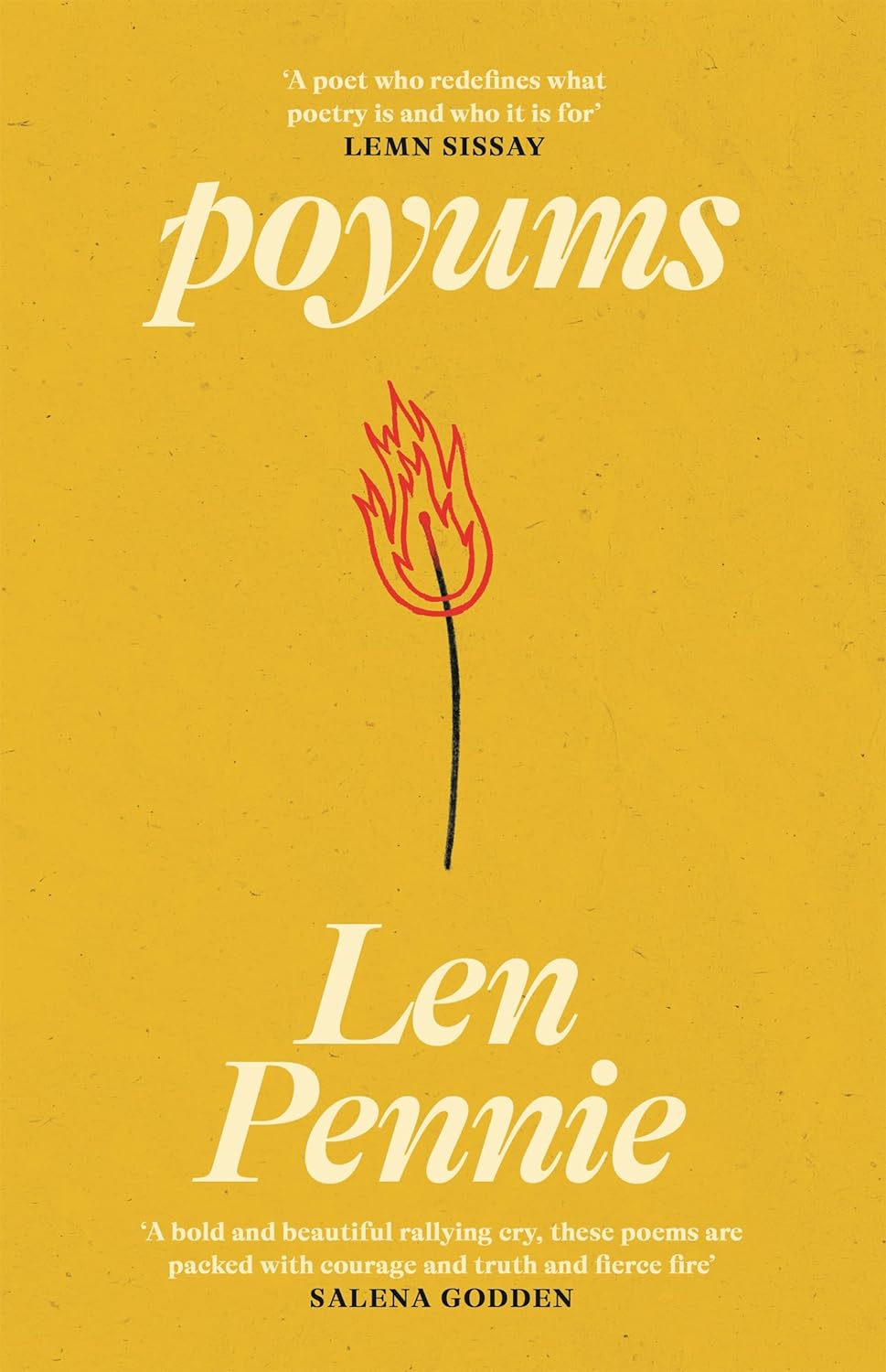Review of poyums by Len Pennie

poyums
Len Pennie
Canongate Books, 2024, 128 pages
$22.00
Reviewed by Allison Quinlan
Len Pennie (or @misspunnypennie as she’s known on Instagram) is a Scottish poet specializing in the Scots language, one of the indigenous languages of Scotland. Her collection covers several topics of varying weight, from descriptions of and experiences with abuse to lighthearted poems on daily life. As a survivor, she boldly uses her platform to shine a light on abuse and empower survivors. Her work is moving in its honest depictions of life during and after abuse. She describes the power each individual holds within themselves to persist on the long road to recovery. I had the pleasure of hearing her read her poetry live; you can hear her emphatic voice in writing as much as in her voice on the stage–her words and her power are her own. She writes, “This story is mine” (91).
Continuing the theme of identity, Pennie pens “Ouroboros.” The poem provides a succinct description of responsibility in abuse. She writes, “And I get it, but there’s not one single excuse / That absolves an abuser of giving abuse: / Not the alcohol, drugs or the childhood or me; / Not your grief for the man that you thought you would be” (50). The entire poem grapples with identity through abuse, the importance of placing responsibility for abuse solely on abusers, and the power Pennie’s poetry brings her.
Part of the experience of reading poyums comes from Pennie’s phenomenal use of Scots. poyums provides readers the opportunity to delve into the beauty of the language at every turn of the page. She not only introduces readers to an inside view of survivorship but also introduces many to a vulnerable language. Pennie’s writing in poyums places the language directly in the hands of those unfamiliar with Scots, which is not widely used in written form outside of some regions of Scotland. Notably, there is no glossary showing the exact meaning of the words, so readers must take the time to explore the language on their own. Curious readers can watch her ‘Scots Word of the Day’ online to learn more about some of the words frequenting her writing.
One great use of Scots is in her poem “Chattin Shite,” where she writes, “Awright, hen, hope you don’t mind, A couldnae help but see / A conversation taking place that didnae involve me; / Never fear, sweet gentle lass, A’m here tae set that right, / Cause aw a lassie needs tae hear is a men there chattin shite” (26). Her use of language aptly portrays the frustration she felt with a man inserting himself into a conversation that doesn’t involve him. Pennie has faced notable backlash online for her feminist work, receiving extensive misogynistic abuse, which she cleverly responds to through a number of her poems. She sets out clear guidance for those who have treated her unacceptably: “If ye didnae want the poetry, dinnae fuck over a poet” (14). Speaking out against abuse, even when confronted with various forms of it so often, is an act of profound courage and defiance that chips away at oppressive structures, empowering others to join the fight for equality and justice.
poyums is an exceptional work, powerfully describing survivorship and offering a connective balm to all who share the experience. For many, poyums is a declaration of ‘you are not alone in this.’ For many more, it provides a window of empathy for survivors’ realities that helps us connect, support each other, and work to prevent abuse. I truly cannot express enough respect for Len Pennie and poyums.
Allison Quinlan (they/she) volunteers as a copyeditor for Sinister Wisdom. They manage a non-profit in the UK that supports survivors of abuse. They also ghostwrite and illustrate part-time.
"Empowerment comes from ideas."
― Charlene Carruthers
"Your silence will not protect you."
— Tourmaline
"Gender is the poetry each of us makes out of the language we are taught."
— Leila Raven


